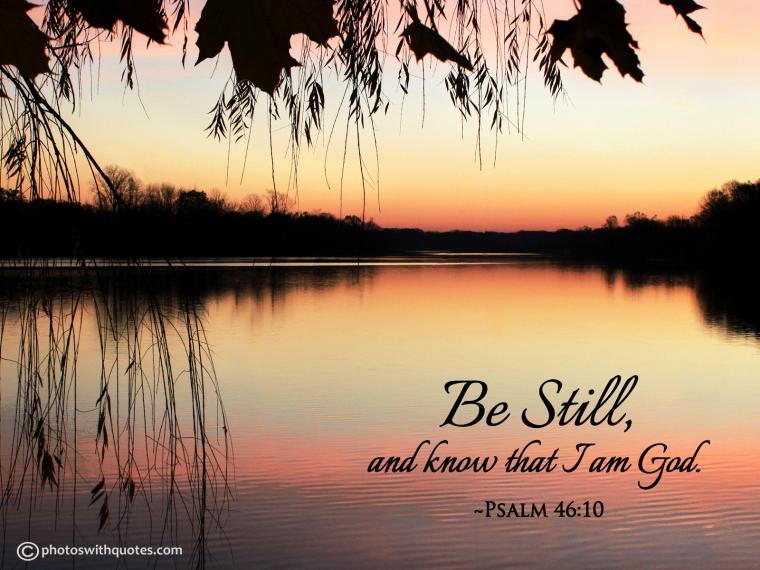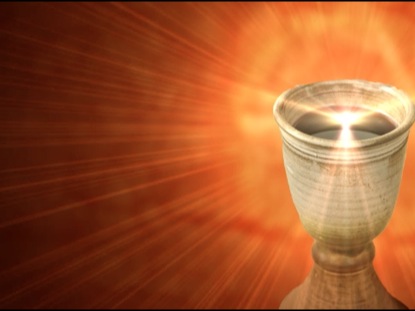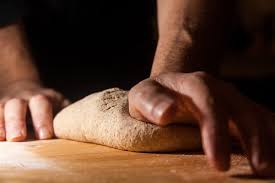Background Passages: Psalm 46:1-10; 2 Corinthians 12:9; Luke 40:35-41
You hear it all the time when a rookie quarterback is starting his first game. The defense will mix up their coverages, blitz from different angles and players, rush, drop back in coverage. They will do anything to confuse the unfortunate rookie.
At some point the announcer, armed with dozens of sports cliches, will invariably say that the game is moving too fast for the quarterback.
The reason it is a cliché is that it’s true. Time, familiarity with the playbook and game experience will make things easier. It will eventually slow the game down.
There sure have been times in my life when I felt like a rookie quarterback. It is a frenetic and noisy world. No day passes without strident debates and diatribes over issues critical to our culture and country. We see natural disasters taking their toll on our safety and security. When the news cycle hits, I find myself covering my eyes, ears and mouth like the proverbial monkey, hoping to see no evil, hear no evil and speak no evil. The game moves too fast.
It is not a lot different in our personal lives. Even when trying to do what we feel God needs us to do, we find ourselves being pulled in a thousand different directions. It feels like the more we try to live a life of service to God, the more obstacles get thrown in our path. The game moves too fast.
It has been my privilege to serve as a member of our church’s Pastor Search Team charged to find a new pastor for the first time in 40 years. As we met as a team last week, we talked about how many things have come up in our lives as individuals that pull us from the task at hand. We talked about how easy it would be to feel overwhelmed and over our heads were God not a calming presence. The game moves too fast.
Amid the noise I hear in the world and in our lives, I also hear a quieter word from scripture.
“Be still and know that I am God.” (Psalm 46:10)
There will come a day when God will quiet the noise of the world, but until then he reminds us to “be still.”
Isaiah tells us “in repentance and rest is your salvation; in quietness and trust is your strength.”
I don’t think that’s the exact message of the Psalmist. We are not to close our eyes, ears and mouth to the clamor and discord. To be still is not a call to silence. It is a reminder that we will find God in the noise.
We find this verse embedded in a section that speaks to the power and security of God. God smothers our fear, declares the psalmist, because he is our strength and fortress in times of constant trouble.
“Be still.”
I’m certainly no Hebrew scholar, but the commentaries tell me not to interpret the word as “silence.” To be quiet or reverential in God’s presence. While there is always a place for quiet reflection of the nature and presence of God, the Hebrew word speaks more to “cease,” “to slacken” to “stop the frantic activity.”
I find that to be a good word for me. When I am pressed and feeling overwhelmed, I always tend to try to do more. To work harder to try and dig out from under my circumstance.
I think of the serene image of the duck on the pond who seems to swim effortlessly but is paddling furiously under water. That’s how I feel sometimes.
Be still is God’s great reminder to quit fighting battles I can’t win on my own. Being still means to chill out enough so you can see God at work and his “ever-present help in trouble.” (vs. 1)
Think of it another way. To be still is to surrender…surrender control of all that is going on in your world to the Almighty. We must lay down our weapons, drop our shields, give up our desire to lead and surrender to the will of the one who is already victorious. On a personal level, it means giving up my belief that I know better or that I can work my way through anything in my own power or force of will.
Being still, you see, is not a passive act where we sit back and do nothing. Rather, to be still we must stop what we’re doing. Back off. Yield control. Surrender. Give up all efforts at personal control and self-preservation.
Lest you feel that makes you feel weak and less of a Christian, remember that Paul rejoiced in his weakness.
“But he said to me, ‘My grace is sufficient for you, for my strength is made perfect in weakness.’ Therefore, I will boast all the more gladly about my weaknesses, so that Christ’s power may rest on me.” (2 Corinthians 12:9)
Therein lies the reason to surrender our control. “Be still and know that I am God.”
The word “know” suggests we discover by sight. Stopping our well-intentioned efforts allows us to see God at work in the world and in our lives. If we’re so focused on doing things on our own, we’ll miss God’s work. Worse, we may well mistake his results for our own, taking credit where no credit is due.
When we stop all our frantic activity, we suddenly rediscover God is God. We come to know him as our refuge. Our strength. Our help. Our protector. Our comfort. Our warrior. Our exalted one.
The disciples were sailing from one side of the Sea of Galilee to the other when a strong storm interrupted their travel. Weary from a long day’s work, Jesus rested in the stern of the boat. The waves grew higher and the disciples struggled to keep the boat afloat. I suspect it was one of the non-fishermen who crawled to the back of the boat to wake Jesus up.
“Don’t you care if we drown?”
Jesus woke up. Rubbed his eyes. Stood up in the boat and commanded the wind.
“Quiet. Be still.”
The same basic word shared by the psalmist. Cease your frantic efforts.
As the gale turned to gust and to a gentle breeze, Jesus turned to his disciples. “Why are you so afraid? Do you still have no faith?”
Surrendering control to God is the ultimate act of faith. It replaces fear with trust.
In the stillness of that hour, the disciples marveled. “Who is this that even the wind and waves obey him?” It is as if Jesus was saying, “Be still and know that I am God.”
The world is chaotic enough without our feeble efforts adding to it. Our circumstances always rest in the hands of God and when we yield our will to his, he will calm the raging soul within us.
“Do not be anxious about anything (stop trying so hard), but in every situation (when life gets frantic), by prayer and petition, with thanksgiving, present your requests to God. And the peace of God (our ability to be quit fighting it), which transcends all understanding, will guard your hearts and minds in Christ Jesus.” (Philippians 4:6-7 with the Lewis translation thrown in)
“Be still and know that I am God.”
We’re not promised a world without chaos. In fact, it sure seems to be getting noisier. The good news of the gospel is that we don’t have to calm the storm around us. When we quit fighting against the current and surrender our lives without reservation to God, when we are still, we see God for who he is.
It’s funny, isn’t it? When I quit fighting it, the game slows down. When I cease doing things in my own ability, the game slows down. When I surrender my will to God’s will, the game slows down. Only then, can I see and know that God is God.
I say it again if only to remind me of its magnificent truth.
“Be still and know that I am God.”








